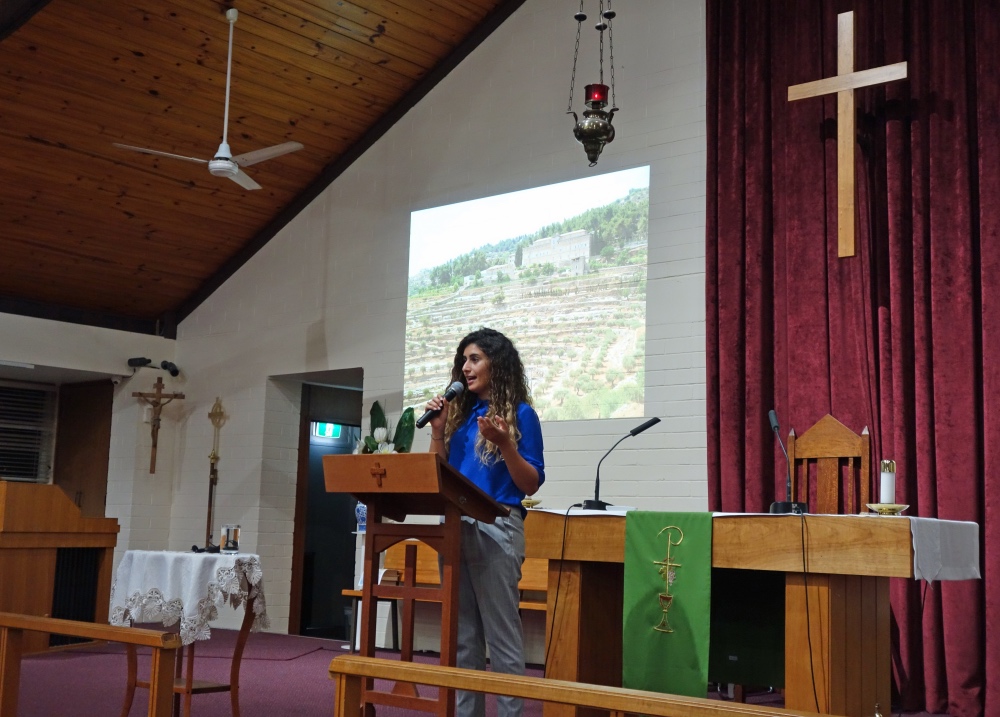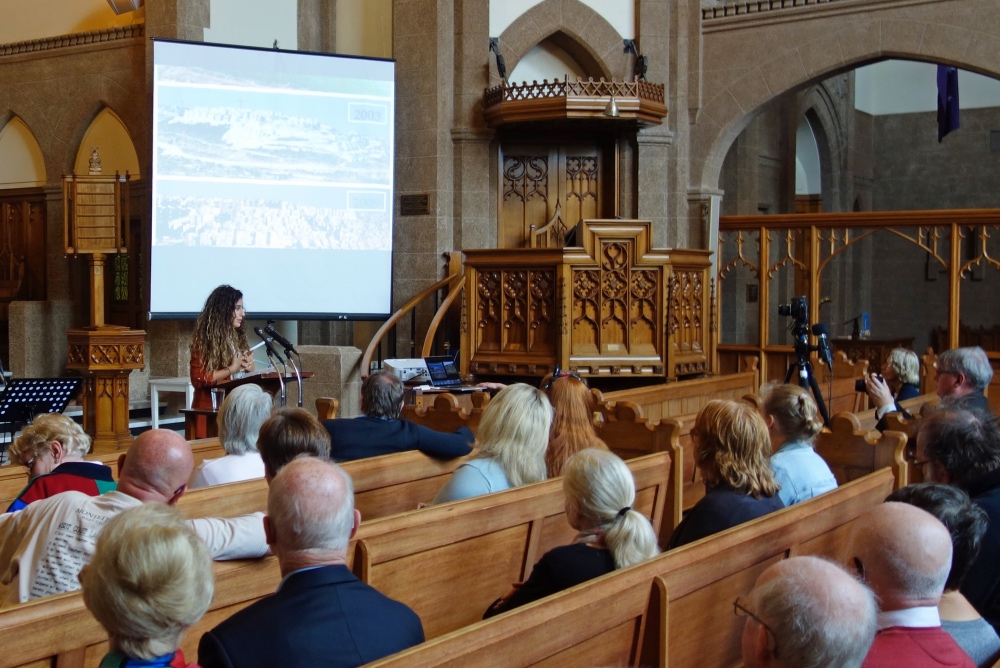
DAVID ADAMS speaks with Palestinian Christian Areej Masoud, in Australia on a speaking tour to talk about the plight of her people…
For Palestinian Christian Areej Masoud, hope is something that she and other Palestinians have to find each day.
“I’m not talking about imaginary hope or a wish kind of hope, but the hope that comes out of a faith and out of believing in the good in humanity, the good in people, that they would act…and try to change the reality,” she says.

Areej Masoud speaks at St Andrew’s Prebysterian Church in Forrest, Canberra. PICTURE: Supplied.
The reality that Masoud refers to is the daily existence of people living in the Palestinian Territories. Herself a resident of Bethlehem – the community where the Bible records Jesus as being born, she says hope is an integral part of daily life for all who live there.
“I believe that anyone who lives in Palestine cannot live there without hope,” she says. “[Y]ou wake up each morning looking for and seeking hope while creating it in your community. I’m sure without that, lots [more] people would leave the country…”
“It’s suffocating us, living in an open air prison…”
– Areej Masoud
Masoud is on a three week speaking tour of Australia – hosted by the Palestine Israel Ecumenical Network, talking to church congregations, college students and other groups about the plight of the Palestinian people.
“[B]ecause a lot of people don’t know what’s going on,” she says, going on to describe life for those in the Palestinian Territories of the West Bank and Gaza as “very challenging”.
These challenges include a lack of access to such necessities as water, healthcare and education, restrictions on freedom of movement, the confiscation of land – such as the recent controversial decision by the Israeli Supreme Court which ruled authorities could demolish a Bedouin village at Khan al-Ahmar, and, what Masoud characterises as “countless human rights violations”.
“It’s suffocating us, living in an open air prison…” she says.
The 27-year-old, who, after being born in Bethlehem spent the next seven years having what she describes as a “normal childhood” in Qatar before returning to her home, is these days an outspoken advocate for her people.
Aside from her day job at the Bethlehem Bible College where she is the coordinator of the Development and Communications Department, Masoud has been on several speaking tours in the US and, among her many roles, is an International Peacemaker through the Presbyterian Church there.
Her decision to become an advocate for her people came about as she wrestled through what it meant to be both a Palestinian and a Christian while studying at university (Masoud studied religious studies and psychology at Bethlehem University).
“I did not know how to live as a Palestinian or a Christian in connection with each other,” she says. “I thought that being Palestinian [means] it’s normal…that I’m under occupation, that I have an enemy, and that means I have to hate my enemy or act violently against my enemy. But then I’m a Christian, I have to love my enemy and I can’t be pro-violence. That always threw confusion on my identities and I didn’t know how to live both of them.”
And while the idea of “loving her enemy” remains challenging in the context in which she lives, Masoud says she’s learnt that she can be true to both her identities – as both a Palestinian and a Christian – without forsaking either.
“By loving my enemy, it means that out of love, I have to hold my enemy responsible to their acts of injustice towards me as a Palestinian or anyone else in the world…Even if I don’t like that person, if they’re doing wrong to someone, in loving my neighbour I have to point that out.”

Areej Masoud addresses another event, this time at the Sunnybank Anglican Church in Brisbane. PICTURE: Supplied.
Masoud is passionate about helping people around the world gain a greater understanding of what life is like for the Palestinian people and says she’d like to see a “tougher stance against what is happening being taken by the international community”.
Alongside the ongoing hardships faced by Palestinians, she says the recent US decision to cut funding to the United Nations Relief and Works Agency for Palestine Refugees in the Near East (UNRWA), which came on the back of US President Donald Trump’s controversial decision to relocate the US Embassy to Jerusalem, has been hard to understand, particularly as it affects some of the most needy among the Palestinians – refugees.
“Cutting funds over such a special needy group, makes us very sad, very upset… she says. “We feel helpless, we feel disrespected, dehumanised, insulted in so many ways.”
She also expressed her disappointment at comments from Australian Prime Minister Scott Morrison this week in which he raised the possibility of Australia following the US in relocating its embassy to Jerusalem.
“The first question that comes to mind is why?” she says. “Why would the Australian embassy need to do that?”
She said it was particularly disappointing to see such a move – which she said would be a “backwards” step in the peace process between Israelis and Palestinians – when a growing number of countries were now supporting the Palestinians in their fight for justice.
Part of the message she’s bringing to Australia is to urge Christians to take what actions they can to help the Palestinian people including visiting her homeland and, as well as seeing Biblical sites, taking the time to see for themselves what daily life is like for the Palestinians.
“I meet a lot of tourists when they are in Bethlehem and then they tell me ‘Oh, I love your country, I love Israel so much’ and I’m like ‘You’re in Palestine now’. They would have no idea; they wouldn’t realize, for example, that Bethlehem is in Palestine…”
– Areej Masoud
“Not only come on a tour – because it’s very easy to come on a group tour and not to see what’s actually happening there,” she says. “But actually meet the Palestinians and learn about the reality and be exposed to what’s happening. To visit not only the things – the locations and history – but actually come and visit the ‘living stone’.”
She points out that there are a number of groups which these days offer people the opportunity to learn more about the Palestinian people and even provide the chance for home stays.
“To get to experience their reality firsthand,” she says. “I meet a lot of tourists when they are in Bethlehem and then they tell me ‘Oh, I love your country, I love Israel so much’ and I’m like ‘You’re in Palestine now’. They would have no idea; they wouldn’t realise, for example, that Bethlehem is in Palestine…”
Masoud’s mission also involves encouraging the Palestinians to remain hopeful.
“We are, as Christians…concerned about a lot of people losing faith – we’re trying to challenge this.”
RELATED – ESSAY: ‘O WALLED-OFF TOWN OF BETHLEHEM’
She says that as well as encouraging each other, the church is also sharing their sense of hope with their Muslim neighbours in an ongoing, informal interfaith dialogue.
“We grew up together,” she says. “We share the same culture.”
Masoud says the central message of the Bible – that of God’s love for all people – needs to be emphasised, particularly given those who would choose to use selected Scriptures to justify abuses against the Palestinian people.
“That love is important and our God is the God justice and He will not forsake us in this situation.”
And while actions such as those taken by the US in recent months may make it look like a solution to the Israel-Palestinian situation is still a long way off, Masoud says she intends to continue to speak up for her people.
“Even though a solution might not come easy, [that] does not mean you should stop asking for it and seeking it and fighting for it in a non-violent way…”
Areej Masoud is in Australia until 27th October. For more, see https://pien.org.au/speaker-tour/





